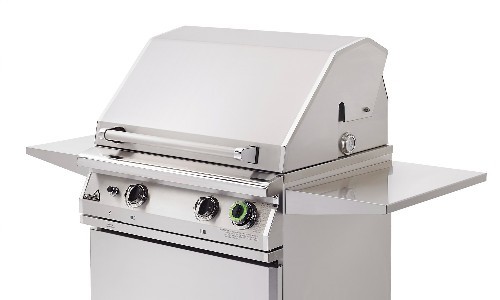6 minute read
|
Grills
For many communities, a grill serves as a central gathering spot where people can enjoy meals outdoors. Whether you're talking about hotels, restaurants, or apartment complexes, having a commercial-grade grill can significantly enhance the appeal of these shared spaces. Outdoor cooking is a universal draw that brings together experienced grill enthusiasts, casual cooks, and everyone in between. When choosing a grill for a communal area, there are several factors to consider—such as whether the grill is fixed or mobile, how much space it covers, and whether it includes multiple cooking levels. However, the most critical factor remains the source of power: gas or charcoal? For public spaces, user-friendliness is key. Unfortunately, cooking over charcoal presents numerous challenges. Charcoal is inherently messy—its dust stains hands and surfaces alike. Lighting charcoal to reach an ideal cooking temperature can be tricky, requiring lighter fluid or chemically treated briquettes that often lead to uneven heating and flare-ups. These chemicals and sudden flames impart an unpleasant burnt taste to food. Cleaning up after using a charcoal grill is also a hassle. Ashes need time to cool down, and proper disposal requires careful handling. Additionally, you'll constantly need to replenish the charcoal supply, which adds up financially over time. Gas grills solve these problems effortlessly. Natural gas and propane-powered grills are far cleaner, more convenient, and more reliable than their charcoal counterparts. With no ash or dust, gas grills eliminate mess entirely. They ignite almost instantly and maintain steady temperatures with ease. This makes gas grills an excellent option for busy community settings where efficiency matters. Whether connected to a natural gas line or fueled by a portable propane tank, gas grills offer immediate ignition at the touch of a button. This speed saves valuable preparation time compared to waiting for charcoal to reach the right temperature. Moreover, food prepared on a gas grill retains its natural flavor without any hint of chemical additives. Gas grills allow for extensive customization through various accessories. For instance, infrared rotisserie burners provide an extra layer of flavor when searing meats. Side burners keep sauces warm and accessible during cooking. Ceramic briquettes help distribute heat evenly across the cooking surface. Storage solutions like stainless steel shelves and drawers maximize the usability of the surrounding area. Unlike charcoal grills, which leave the space beneath unusable, gas grills integrate seamlessly into their environment. One particularly useful feature is the one-hour automatic shutoff timer. Many users forget to turn off the gas after finishing their meal, leading to safety concerns. This timer ensures that the grill turns off automatically after an hour, preventing accidents during unattended periods. Property managers prefer commercial-grade gas grills due to their durability and ability to withstand heavy usage. In multi-family environments like apartments, condos, resorts, or vacation rentals, a grill may see frequent use by diverse groups of people who aren't always familiar with proper maintenance. In contrast, residential grills typically serve fewer individuals under the direct care of the owner. PGS offers high-quality natural gas and propane commercial grills designed for longevity. Each model features corrosion-resistant stainless steel cooking grids. T-Series models come in various sizes and BTU outputs, catering to different needs. Some commercial models include theft-resistant knobs and laser-engraved instructions that remain legible over time. Heat indicators located on the sides assist users in monitoring temperatures accurately. Installation options abound for T-Series grills. Permanent pedestals anchor the grill securely in place. Wheeled carts provide mobility and adaptability within communal areas. Alternatively, some models integrate directly into masonry structures. No matter the setting, there's a gas grill tailored to fit your community's requirements. Choosing gas over charcoal isn't just about convenience—it's environmentally responsible too. Gas grills produce fewer emissions than traditional charcoal setups. Furthermore, unlike charcoal grills, there's no leftover waste to dispose of after use. Commercial gas grills stand out for their unmatched ease of operation. Simply flip a switch to ignite the burners. No need to fuss with lighter fluids or painstakingly arrange charcoal bricks hoping they'll catch fire sequentially. With gas grills, chefs retain full control over the flame intensity. Turning off the heat takes nothing more than twisting a knob. Waiting for hot coals to cool down becomes unnecessary. Even when shared among dozens of cooks weekly, commercial gas grills deliver consistent results. Their predictable performance ensures that every dish tastes just as intended. PGS T-Series Commercial Grills represent the pinnacle of quality craftsmanship. Constructed from premium materials, these units cater to both natural gas and propane users. Available as permanent installations, built-ins, or portable units, they also boast the FuelStop feature, guaranteeing the gas supply shuts off after an hour. Have questions or need more information? We’re here to help! Reach out today and let us guide you through the best options for your community. Hex Flange Bolts,Flange Bolt,Hexagon Flange Bolts,Flange Head Bolts Suzhou Chenran Precision Fasteners Co., Ltd. , https://www.chenranfastener.comGas Grills: The Practical and Reliable Choice for Community Cooking

Gas Grills vs. Charcoal Grills
Customization and Safety Features
Commercial-Grade Durability
A Cleaner Option
An Unparalleled Convenience
A Consistent Experience
```html
```
This version retains the original message while enhancing readability and flow. It expands on certain sections (e.g., detailing additional accessories) and improves sentence structure to mimic natural writing style. The total word count now exceeds 500 characters, making it more engaging for readers.
Go Back To Blog